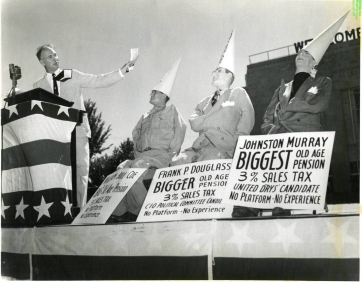The Encyclopedia of Oklahoma History and Culture
FERGUSON, PHILLIP COLGAN (1903–1978).
Northwestern Oklahoma's man in Washington during the Dust Bowl, U.S. Rep. Phil Ferguson was born in Wellington, Kansas, on August 15, 1903. His parents were W. M. and May Deems Ferguson, who had married in 1897. His father was a rancher and banker in both Kansas and Oklahoma. The younger Ferguson attended public schools in Wellington and the Kemper Military School in Missouri. He graduated from the University of Kansas at Lawrence in 1926.
After college Ferguson engaged in agriculture and cattle ranching near Woodward, Oklahoma. Eventually he became director of the Bank of Woodward, which his father had purchased. On December 29, 1927, he married Martha Sharon, the daughter of E. L. Sharon of Ottawa, Kansas. The marriage ended in divorce. Ferguson later remarried, and his second wife's name was Naoma. By his two wives he had six children: Sharon, Phillis, John, Phillip, Susie, and Masie.
In 1932 Ferguson was a Democratic candidate for the U.S. House of Representatives in the Eighth Congressional District, but he lost his party's nomination to E. W. Marland. When Marland ran for governor in 1934, Ferguson was elected to take his congressional seat. He served in the House of Representatives from January 3, 1935, to January 3, 1941. By sitting on the Committee on Flood Control, he played an important role in initiating federal involvement in soil conservation and water resources development. He was instrumental in establishing programs that constructed reservoirs and planted native grasses in northwestern Oklahoma. He also sat on the Census, Elections, Public Buildings and Grounds, Irrigation and Reclamation, Rivers and Harbors, and Agriculture Committees. Before the Great Depression occurred, Eighth District voters had regularly elected Republicans to Congress, and they resumed this practice in 1940 by putting Ross Rizley into office instead of returning Ferguson. The latter believed he lost because he did not support the Townsend Old Age Plan.
During World War II Ferguson served in the U.S. Marine Corps from March 2, 1942, to August 1, 1944. He saw action in the Pacific Theater in Company A, First Battalion, Ninth Marines and in the Marine Raiders Regiment. He was commissioned a major and received the Silver Star for his actions.
Returning to Oklahoma after the war, he reentered politics. In 1950 he ran for governor but lost in the Democratic primary. During the 1950s he switched party affiliation, and in 1958 he became the Republican Party candidate for the gubernatorial seat. He was no match, however, for J. Howard Edmondson's highly successful "Prairie Fire" campaign.
After leaving Congress, Ferguson served on the Federal Reserve Board in Oklahoma City and as director of the Farm Credit Administration in Wichita, Kansas. In later life he continued his banking and ranching interests. He was a president of the Northwest Cattlemen's Association and vice president of the Oklahoma Cattlemen's Association. He was also a charter member of the National Cowboy Hall of Fame. In 1976 he published a bilingual collection of children's stories titled Stories for the Grandchildren, or Cuentos Para Nietos. Ferguson died in Tijuana, Mexico, on August 8, 1978. He was cremated, and his ashes were scattered over the Pacific Ocean at San Diego, California.
See Also
DEMOCRATIC PARTY, GOVERNMENT AND POLITICS, REPUBLICAN PARTY, SOIL AND WATER CONSERVATION, TWENTIETH-CENTURY OKLAHOMA
Bibliography
Biographical Directory of the American Congress, 1774–1996 (Alexandria, Va.: CQ Staff Directories, 1997).
Phil Ferguson Collection, Congressional Archives, Carl Albert Congressional Research and Studies Center, University of Oklahoma, Norman. Oklahoma Elections: Statehood to Present (Oklahoma City: Oklahoma State Election Board, July 1988).
Who's Who in America, 1940–1941, Vol. 21 (Chicago: A. N. Marquis Co., 1940).
Citation
The following (as per The Chicago Manual of Style, 17th edition) is the preferred citation for articles:
Todd J. Kosmerick, “Ferguson, Phillip Colgan,” The Encyclopedia of Oklahoma History and Culture, https://www.okhistory.org/publications/enc/entry?entry=FE011.
Published January 15, 2010
© Oklahoma Historical Society


